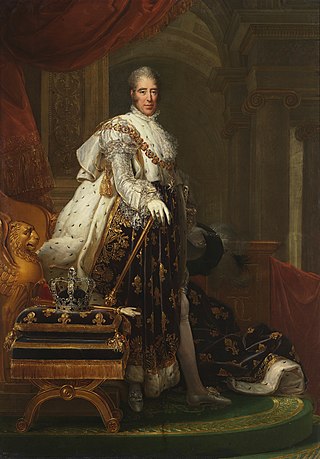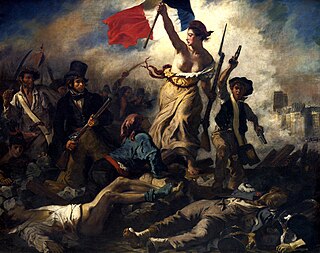
The French Revolution was a period of political and societal change in France that began with the Estates General of 1789, and ended with the coup of 18 Brumaire in November 1799 and the formation of the French Consulate. Many of its ideas are considered fundamental principles of liberal democracy, while its values and institutions remain central to modern French political discourse.

Louis XVI was the last king of France before the fall of the monarchy during the French Revolution.

Charles Louis de Secondat, Baron de La Brède et de Montesquieu, generally referred to as simply Montesquieu, was a French judge, man of letters, historian, and political philosopher.

In the history of France, the First Republic, sometimes referred to in historiography as Revolutionary France, and officially the French Republic, was founded on 21 September 1792 during the French Revolution. The First Republic lasted until the declaration of the First Empire on 18 May 1804 under Napoléon Bonaparte, although the form of the government changed several times.

The Bourbon Restoration was the period of French history during which the House of Bourbon returned to power after the first fall of Napoleon on 3 May 1814. Briefly interrupted by the Hundred Days in 1815, the Restoration lasted until the July Revolution of 26 July 1830. Louis XVIII and Charles X, brothers of the executed King Louis XVI, successively mounted the throne and instituted a conservative government intended to restore the proprieties, if not all the institutions, of the Ancien Régime. Exiled supporters of the monarchy returned to France but were unable to reverse most of the changes made by the French Revolution. Exhausted by decades of war, the nation experienced a period of internal and external peace, stable economic prosperity and the preliminaries of industrialization.

Charles X was King of France from 16 September 1824 until 2 August 1830. An uncle of the uncrowned Louis XVII and younger brother to reigning kings Louis XVI and Louis XVIII, he supported the latter in exile. After the Bourbon Restoration in 1814, Charles became the leader of the ultra-royalists, a radical monarchist faction within the French court that affirmed absolute monarchy by divine right and opposed the constitutional monarchy concessions towards liberals and the guarantees of civil liberties granted by the Charter of 1814. Charles gained influence within the French court after the assassination of his son Charles Ferdinand, Duke of Berry, in 1820 and succeeded his brother Louis XVIII in 1824.

The political history of France covers the history of political movements and systems of government in the nation of France, from the earliest stages of the history of France until the present day. This political history might be considered to start with the formation of the Kingdom of France, and continue until the present day.

The Society of the Friends of the Constitution, renamed the Society of the Jacobins, Friends of Freedom and Equality after 1792 and commonly known as the Jacobin Club or simply the Jacobins, was the most influential political club during the French Revolution of 1789. The period of its political ascendancy includes the Reign of Terror, during which well over 10,000 people were put on trial and executed in France, many for political crimes.

Orléanist was a 19th-century French political label originally used by those who supported a constitutional monarchy expressed by the House of Orléans. Due to the radical political changes that occurred during that century in France, three different phases of Orléanism can be identified:

Louis Philippe II, Duke of Orléans, was a French Prince of the Blood who supported the French Revolution, in the course of which he was executed.

The French Second Republic, officially the French Republic, was the second republican government of France. It existed from 1848 until its dissolution in 1852.

The July Monarchy, officially the Kingdom of France, was a liberal constitutional monarchy in France under Louis Philippe I, starting on 26 July 1830, with the July Revolution of 1830, and ending 23 February 1848, with the Revolution of 1848. It marks the end of the Bourbon Restoration (1814–1830). It began with the overthrow of the conservative government of Charles X, the last king of the main line House of Bourbon.
There is significant disagreement among historians of the French Revolution as to its causes. Usually, they acknowledge the presence of several interlinked factors, but vary in the weight they attribute to each one. These factors include cultural changes, normally associated with the Enlightenment; social change and financial and economic difficulties; and the political actions of the involved parties. For centuries, the French society was divided into three estates or orders.

Dick Taverne, Baron Taverne, is a British politician and life peer who served as Member of Parliament (MP) for Lincoln from 1962 to 1974. A member of the Liberal Democrats, he was a Labour MP until his deselection in 1972, following which he resigned his seat and won the subsequent by-election in 1973 as a Democratic Labour candidate.

The Fête de la Fédération was a massive holiday festival held throughout France in 1790 in honour of the French Revolution, celebrating the Revolution itself, as well as national unity.

The Revolutions of 1830 were a revolutionary wave in Europe which took place in 1830. It included two "romantic nationalist" revolutions, the Belgian Revolution in the United Kingdom of the Netherlands and the July Revolution in France along with rebellions in Congress Poland, Italian states, Portugal and Switzerland. It was followed eighteen years later, by another and much stronger wave of revolutions known as the Revolutions of 1848.

The Society of the Friends of the Constitution, better known as Feuillants Club, was a political grouping that emerged during the French Revolution. It came into existence on 16 July 1791. The assembly split between the Feuillants on the right, who sought to preserve the position of the king and supported the proposed plan of the National Constituent Assembly for a constitutional monarchy; and the radical Jacobins on the left, who wished to press for a continuation of the overthrow of Louis XVI. It represented the last and most vigorous attempt of the moderate constitutional monarchists to steer the course of the revolution away from the radical Jacobins.
Monarchism is the advocacy of the system of monarchy or monarchical rule. A monarchist is an individual who supports this form of government independently of any specific monarch, whereas one who supports a particular monarch is a royalist. Conversely, the opposition to monarchical rule is referred to as republicanism.
Monarchism in the United States is the advocacy of a monarchical form of government in the United States of America. During the American Revolution a significant element of the population remained loyal to the British crown. However, aside from a few considerations in the 1780s, since independence there has not been any serious movement for an American monarchy.

The Conférence Molé was a French debating society founded in 1832. In 1876 it became the Conférence Molé-Tocqueville. Its purpose was to debate legislation, administration, political economy and general politics. The debates were modeled on parliamentary procedures and served to train future politicians. The society also provided a venue where young men of the élite could meet and become known by established political figures. The society became dormant in the 1970s but was revived in the 1990s.















